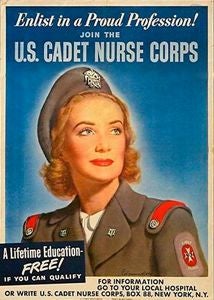At 100, WWII Nurse Cadet Agnes Lowe Still Fighting for Veteran Recognition


Image sources: Case Western, wjhl
In Cocke County, Tennessee, the community has reason to celebrate: Agnes Lowe, a former World War II Nurse Cadet, recently turned 100 years old. Her centennial milestone is not just a moment of personal pride, but a marker of decades of advocacy, courage, and unflagging commitment to her country and profession.
Though the Cadet Nurse Corps folded after the war, Agnes never stopped advocating for those who served alongside her: she is now among the leading voices pressing Congress to grant these former Cadet Nurses "veteran status," a recognition she believes is long overdue.
The Cadet Nurse Corps: Service Without Recognition
During WWII, the United States faced a critical shortfall of trained nurses to care for military personnel, veterans, and civilians alike — and many hospitals were overwhelmed. In response, Congress passed the Nurse Training Act of 1943 (often referred to as the Bolton Act), which established the Cadet Nurse Corps.
The program offered accelerated nursing training in exchange for service to military, public health, VA, and civilian hospitals during the war. Nearly 120,000 women completed Cadet Nurse training by the time the program ended in 1948.
"We did 80% of the nursing that was done on the Homefront, and we were credited with saving the healthcare system," said Lowe. "The Surgeon General at that time had said that we were as important to the healthcare system as the Marines were to D-Day."
However, while these nurses served in uniform — essentially bridging public health and military medicine — they were never granted the full privileges or legal status that we typically associate with military veterans. The law explicitly prohibited "military status" in its original text.
For decades, their service was honored in speeches, museum exhibits, and nursing histories, but without the benefit packages, discharge paperwork, or burial recognitions that come with veteran status.

Image source: Case Western
100 Years Strong: The Legacy of Agnes Lowe
At her 100th birthday celebration, Agnes was surrounded by family, friends, and admirers, all dressed in pink (her favorite color).
At the birthday event, Agnes and two fellow former Cadet Nurses spoke publicly about their cause: pushing the U.S. Congress to pass legislation granting the entire corps veteran-style recognition.
Her daughter, Donna Penick, has carried on much of the advocacy work in recent years, pressuring congressional offices, gathering constituent support, and engaging with her home-state senators.
Image source: wjhl
The U.S. Cadet Nurse Corps Service Recognition Act
In recent years, lawmakers on both sides of the aisle have introduced legislation known as the U.S. Cadet Nurse Corps Service Recognition Act (sometimes dated or versioned as 2021 or 2023 versions).
What the bill proposes:
- Grant honorary veteran status to those who served in the Cadet Nurse Corps.
- Provide an honorable discharge where merited.
- Authorize a service medal and permit burial plaques or grave markers to acknowledge their service.
- Importantly, the bill does not propose extending full VA benefits, pensions, or health care.
Advocates — including the American Nurses Association, American Association of Colleges of Nursing, and a coalition of nursing groups — have lent their support.
In 2025, the Senate Veterans’ Affairs Committee held hearings on the measure. The committee considered testimony and advocacy offered in support of granting recognition to Cadet Nurses. Despite the momentum, the bill has not yet been passed into law. Its fate hinges on further congressional action, bipartisan support, and continued pressure from constituents and veteran groups.
Why This Matters: For Nurses, History, and Recognition
To many in the nursing community, the cause is not just symbolic. It’s about acknowledgement of a vital, underappreciated chapter in nursing history: women who stepped forward during a crisis, many of them young and from small towns, who accepted the call of service under difficult circumstances.
For Agnes Lowe and her colleagues, securing veteran status is a way to cement their legacy not as auxiliary or peripheral, but as integral to the U.S. wartime medical effort. It is also a reminder to newer generations of nurses that advocacy, even late in life, can shape how history remembers us.
🤔 What do you think about the Cadet Nurse Corps Service Recognition Act? Let us know in the discussion forum below.
If you have a nursing news story that deserves to be heard, we want to amplify it to our massive community of millions of nurses! Get your story in front of Nurse.org Editors now - click here to fill out our quick submission form today!







